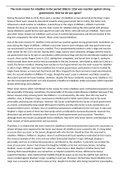The main reason for rebellion in the period 1066 to 1216 was reaction against strong
government. How far do you agree?
During the period 1066 to 1216, there were a number of rebellions across almost all of the kings’ reigns.
Some of them were caused by discontent towards strong government but in reality, this factor only
influenced a small number or rebellions, mainly those in the reigns of William I, William II and John.
Instead, the issue of succession was the main reason for rebellion during this time period with all kings
facing rebellions caused by this issue apart from John and Henry I who did not face rebellion. There were
also other minor reasons for rebellions such as loss of continental possessions and the personality of the
king but compared to the other factors, these rarely caused rebellions.
One of the main reasons for rebellion in the period was reaction against strong government. Sometimes, as
seen during the reigns of William I, William II and John, barons were unhappy with how government was
run and viewed it as harsh so as such, rebelled. This is predominantly evident in John’s reign and was the
main reason for the 1215 civil war. During John’s reign, barons were constantly unhappy with the way he
ran government due to his lack of consultation unlike previous kings and also his extortionate taxation and
as such, drew up the Magna Carta in 1215, stating their complaints, and forced John to sign it, saying he
would consult them more and be held accountable to the law. However, John failed to abide by it and as a
result, the barons revolted, showing how reaction to harsh government was the main reason for rebellion
in John’s reign. William I also faced rebellion due to harsh government, particularly in how he treated his
Anglo-Saxon Barons as many had their lands and titles stripped from them and were taxed extortionately.
Also, the second rebellion in William II’s reign, though the exact cause is unknown, was likely caused by
discontent towards his heavy taxation. However, despite this factor evidently causing some rebellions, it is
not the most important factor as it only impacted a handful of rebellions unlike succession which impacted
almost all the kings and rebellions.
Other minor factors which contributed to the reason for some rebellions were continental possessions and
the personality of the king. Sometimes, the personality of the king could influence rebellions because if the
barons viewed a king as being harsh, like William I, or untrustworthy, like John, then this may lead to
rebellion. Also, in Stephen's reign, many barons rebelled and he failed control them due to his weak
personality and being too chivalrous. However, this factor contributed to the factor of harsh government
as a harsh, untrustworthy king would often govern harshly and thus this factor is only contributory as it
impacted other factors. Similarly, loss of continental possessions contributed to the civil wars in John and
Stephen’s reigns as both of them lost Normandy which contributed to baronial discontent; however this
discontent was primarily created by other factors of harsh government and succession. Therefore,
although these two factors occasionally led to rebellions, they were only minor factors contributing to the
main reasons of harsh government and succession.
Therefore, it is evident that the main reason for rebellions in this time period was issues over succession as
almost all kings were impacted by this factor and almost all rebellions were caused by this. If a king failed
to secure their successor or the barons disagreed with who the heir should be then this may lead to
rebellion. William I, William II, Stephen, Henry II and Richard all faced rebellions motivated by this reason.
The clearest example of this is the civil war which dominated Stephen’s reign. Although Stephen’s
personality and loss of continental possessions contributed to the rebellion, it primarily surrounded the
issue of succession. Henry I had chosen his daughter Matilda as his heir and many barons, including
Stephen, swore an oath to support her. However, when Henry I died, Stephen’s brother Henry lied,
claiming that instead Stephen was named heir so Stephen seized the throne. Whilst some barons
supported Stephen, many believed that Matilda should be queen as she was the rightful heir and thus
many revolted against Stephen’s reign, resulting in civil war. Moreover, Richard also faced rebellion in his
reign over succession as he failed to name an heir, despite his brother John being named heir presumptive,




